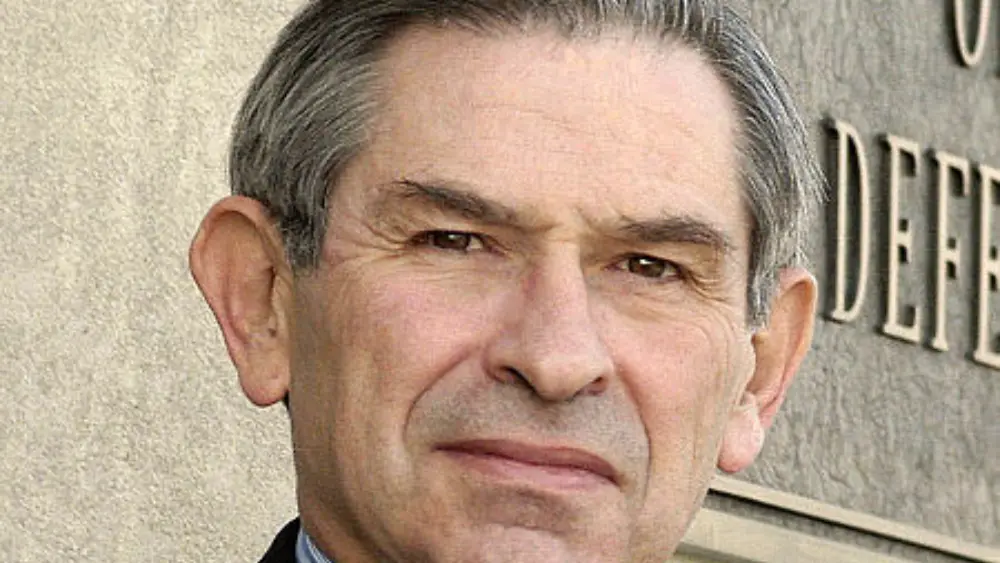Paul Dundes Wolfowitz, born on December 22, 1943, is an American political scientist and diplomat known for his influential role as the Deputy Secretary of Defense in the George W. Bush administration. His tenure was marked by significant policy decisions, including the Iraq War, which had profound implications for U.S. foreign relations and military strategy.
Early Life and Academic Achievements
Paul Wolfowitz’s early life was marked by a commitment to academic excellence. He obtained his bachelor’s degree from Cornell University, showcasing an early dedication to intellectual pursuits. Continuing his educational journey, Wolfowitz pursued graduate studies at the University of Chicago, where he earned a Ph.D. in political science. His academic achievements reflected a deep engagement with political theory and international affairs, setting the stage for a career that would bridge academia and government service.
The academic foundation Wolfowitz built during his formative years equipped him with the analytical and intellectual tools essential for the challenges he would later face in the realms of foreign policy and national security. Furthermore, this solid educational background not only laid the groundwork for his future endeavors but also instilled in him a deep understanding of complex geopolitical issues. His commitment to scholarly rigor and understanding the complexities of political science would become evident in his subsequent roles within the U.S. government, where he played key roles in shaping policy and strategy.
Paul Wolfowitz: Strategic Vision and Cold War Policy
Paul Wolfowitz’s early career was characterized by his strategic vision and influential contributions to U.S. policy during the Cold War. In roles within the U.S. government, including positions at the Arms Control and Disarmament Agency and the State Department, Wolfowitz played a crucial part in shaping policies that addressed the complexities of the Cold War. His keen understanding of strategic interests and commitment to national security issues positioned him as a key figure in formulating and implementing policies that reflected the geopolitical challenges of the era.
During this period, Wolfowitz’s work demonstrated not only his intellectual prowess but also his practical approach to addressing global issues. His strategic vision contributed to the development of policies that sought to navigate the intricate dynamics of the Cold War, emphasizing the need for a nuanced and adaptive approach in the face of evolving geopolitical landscapes. These early experiences laid the groundwork for his later roles in higher-profile positions within the U.S. government.
Deputy Secretary of Defense Under George H.W. Bush
During President George H.W. Bush’s administration, Paul Wolfowitz assumed the position of Under Secretary of Defense for Policy from 1989 to 1993, marking a crucial phase in his government service. In this influential role, Wolfowitz was instrumental in shaping the policies of the Department of Defense during a time of momentous geopolitical shifts, particularly the conclusion of the Cold War. As the global landscape underwent substantial transformations, Wolfowitz’s expertise and strategic insights played a vital role in guiding the United States through the complexities of a post-Cold War era.
Wolfowitz’s tenure as the Under Secretary of Defense for Policy was marked by a focus on adapting military and defense strategies to the evolving international environment. His contributions during this period showcased a dedication to crafting policies that reflected the changing dynamics of global geopolitics, emphasizing the need for strategic adjustments in response to new challenges and opportunities. This experience laid the groundwork for Wolfowitz’s continued influence in subsequent government roles and solidified his reputation as a key architect of U.S. defense and security policies.
Paul Wolfowitz: Defense Planning and Post-Cold War Strategy
In the aftermath of the Cold War, Paul Wolfowitz played a pivotal role in defense planning and strategy formulation, contributing significantly to the restructuring of the U.S. military. His insights and influence were instrumental in adapting the nation’s defense apparatus to the changing international landscape, marked by the dissolution of the Soviet Union and the emergence of new geopolitical dynamics. As the world moved away from the Cold War’s power structure, Wolfowitz emphasized the need for strategic realignment, recognizing the importance of addressing emerging challenges and opportunities on a global scale.
Wolfowitz’s contributions to post-Cold War defense planning reflected a forward-looking approach that sought to position the United States to navigate the complexities of the modern world. His strategic vision aimed at ensuring the U.S. military was equipped and organized to address diverse threats, fostering adaptability and preparedness in an era marked by evolving security concerns. This phase of Wolfowitz’s career laid the groundwork for his subsequent roles in government service, where his commitment to strategic foresight and policy innovation continued to shape the trajectory of U.S. defense and security strategies.
The George W. Bush Administration and the Iraq War
In 2001, Paul Wolfowitz re-entered the Department of Defense, assuming the role of Deputy Secretary under Secretary Donald Rumsfeld in the George W. Bush administration. His return marked a critical period in U.S. foreign policy, and his influence became particularly pronounced in the lead-up to the U.S. invasion of Iraq in 2003. The administration, including Wolfowitz, asserted that Iraq, under Saddam Hussein, possessed weapons of mass destruction (WMDs), and this belief served as a primary justification for the military intervention.
The Iraq War, often referred to as the most contentious and controversial foreign policy decision of the era, unfolded with the objective of dismantling Iraq’s alleged WMD program and fostering democratic change in the region. However, the failure to find conclusive evidence of WMDs in Iraq raised questions about the accuracy of pre-war intelligence and triggered widespread criticism. The Iraq War and its aftermath became central to debates about U.S. foreign policy, the principles of intervention, and the long-term consequences of military engagements in the Middle East. Wolfowitz’s role in advocating for the invasion became a subject of scrutiny, contributing to a broader examination of the decision-making processes that shaped this pivotal chapter in contemporary history.
Paul Wolfowitz: Advocacy for the Iraq War
Paul Wolfowitz emerged as a vocal advocate for the Iraq War, playing a prominent role in promoting the Bush administration’s case for military intervention. One of his key arguments was that removing Saddam Hussein from power would not only eliminate a perceived threat posed by Iraq’s weapons of mass destruction but also contribute to regional stability and the spread of democracy in the Middle East. Wolfowitz, along with other administration officials, emphasized the potential positive repercussions of the Iraq War, envisioning a transformative impact on the political landscape of the region.
However, the post-invasion period revealed a stark discrepancy between the pre-war assertions and the actual situation on the ground. The failure to discover weapons of mass destruction in Iraq undermined the credibility of the administration’s justification for the war, leading to widespread criticism and raising questions about the accuracy of the intelligence that had been presented. The advocacy for the Iraq War, including Wolfowitz’s role in shaping the narrative, became a subject of scrutiny, contributing to broader discussions about the decision-making processes, accountability, and the consequences of military interventions in the complex geopolitical landscape of the Middle East.
Post-Government Career and Continued Influence
In the aftermath of his government service, Paul Wolfowitz transitioned to a post in academia and think tanks, where he continued to exert influence on discussions surrounding foreign policy and international affairs. Embracing roles that allowed him to engage with scholars, policymakers, and the public, Wolfowitz brought his wealth of experience to academic institutions and think tanks, becoming a prominent voice in shaping the discourse on U.S. foreign policy. His insights frequently draw from his involvement in critical events such as the Iraq War. Not only added depth but also nuanced perspectives to discussions on global security, democratic values, and the role of the United States in a rapidly changing world. Furthermore, his experiences provided a unique vantage point, enriching the dialogue surrounding international relations.
Despite the controversies surrounding the Iraq War and his tenure at the Department of Defense, Wolfowitz’s continued engagement showcased his enduring influence on foreign policy debates. Whether through academic publications, public lectures, or participation in policy forums, people sought and analyzed his perspectives. This reflects the enduring impact of his ideas on the broader landscape of international relations and American foreign policy.

Paul Wolfowitz: Legacy and Controversy
A complex interplay of admiration and controversy marks Paul Wolfowitz’s legacy. Supporters of Wolfowitz applaud his commitment to promoting democracy and his role in shaping U.S. foreign policy during critical periods, particularly the end of the Cold War and the post-9/11 era. As the Deputy Secretary of Defense, he played a significant part in restructuring the military and navigating geopolitical challenges.
However, controversy also entwines Wolfowitz’s legacy, most notably associated with the Iraq War. The decision to invade Iraq, based on the belief that the country possessed weapons of mass destruction, has been widely criticized, and the subsequent failure to find such weapons led to a reassessment of the intelligence used to justify the war. The controversy surrounding the Iraq War has influenced perceptions of Wolfowitz’s tenure at the Department of Defense, adding a layer of scrutiny to his legacy.
The ongoing debate underscores the challenges of assessing individuals’ impact on foreign policy. This is especially true in the context of complex geopolitical decisions with long-term consequences. Additionally, this discourse highlights the inherent difficulties associated with attributing specific outcomes solely to individual actions within the intricate web of international relations.










